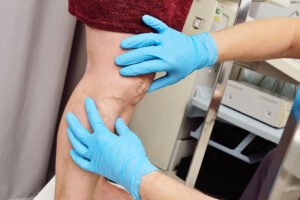How do you prevent varicose veins from getting worse?
 Varicose veins are a common problem, and there’s often no way to prevent them. Sure, you can reduce risk factors like obesity and a sedentary lifestyle, but they’re often the result of being on your feet too much or, worse, a genetic predisposition or aging. They’re unsightly and uncomfortable, and without treatment, varicose veins can lead to more serious health conditions. But if there’s no way to prevent them, is there at least some way to prevent varicose veins from getting worse?
Varicose veins are a common problem, and there’s often no way to prevent them. Sure, you can reduce risk factors like obesity and a sedentary lifestyle, but they’re often the result of being on your feet too much or, worse, a genetic predisposition or aging. They’re unsightly and uncomfortable, and without treatment, varicose veins can lead to more serious health conditions. But if there’s no way to prevent them, is there at least some way to prevent varicose veins from getting worse?
If you’d like to know how to prevent varicose veins from getting worse, you must first understand why they happen in the first place. Veins are meant to move blood in one direction, carrying it to your heart. To accomplish this task, veins have valves that only allow the blood to move the right way. Unfortunately, sometimes these valves become damaged, and they allow blood to flow backwards and pool in the veins. This is called venous insufficiency, and it often happens in the legs, because gravity is working against the blood trying to flow to the heart. The result of this blood pooling is varicose veins, which swell and cause discomfort. You’re at higher risk of developing varicose veins as you age, and other risk factors include being female, being overweight, pregnancy, standing or sitting for long stretches, previous blood clots, and, yes, family history and genetics.
Fortunately, there are some steps you can take to prevent varicose veins from getting worse. So, while you can’t help aging, or erase varicose veins from your family history, you can take the following steps.
- Get some exercise. Regular exercise helps keep your blood circulating and assists with getting it to the heart. This can reduce your risk of getting varicose veins in the first place, and it can definitely help keep them from getting worse.
- Lose some weight. Being overweight puts stress on the legs, and it raises your risk of heart disease, stroke, and type 2 diabetes. Losing weight can reduce your risk factors for all of those conditions as well as preventing new varicose veins from forming.
- Put your feet up. When you elevate the legs, preferably above the heart, you facilitate blood flow to the heart and help reduce the risk of varicose veins.
- Don’t sit or stand too long. If your job requires prolonged sitting or standing, take frequent breaks and move around, and make sure to work in some physical activity after work.
- Dress for success. Don’t wear tight-fitting clothes, which can increase the pressure on your legs and make varicose veins worse, but do wear compression stockings, which promote blood circulation by applying uniform pressure.
The most effective way to treat varicose veins, however, is to seek the care of a specialist. There are many different varicose vein treatments, and most of them are minimally invasive. While they’re all a little bit different, they all focus on closing the affected vein so that blood can be rerouted into a new, healthy vein. An experienced vein specialist will help you decide the right varicose vein treatment for you.
If you’re seeking the best varicose veins treatment or care for other vein issues, trust the board-certified physicians at the Arizona Vein & Laser Institute. Using the most advanced technology, the vascular and cardiovascular surgeons at the Arizona Vein & Laser Institute provide care for all types of venous diseases. With over 40 years of experience, our team of experienced physicians can devise the right treatment plan to address your venous disease problems. For more information contact us through our website.
